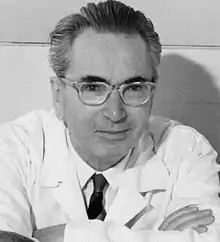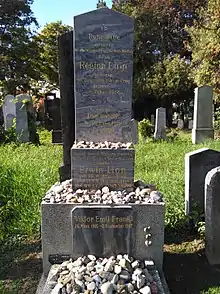Viktor Frankl
Viktor Emil Frankl (26 March 1905 – 2 September 1997)[1] was an Austrian neurologist, psychiatrist, philosopher, author, and Holocaust survivor.[2]
Viktor Frankl | |
|---|---|
 Frankl in 1965 | |
| Born | Viktor Emil Frankl 26 March 1905 |
| Died | 2 September 1997 (aged 92) Vienna, Austria |
| Resting place | Zentralfriedhof, Vienna, Austria, Old Jewish Section |
| Nationality | Austrian |
| Education | Doctorate in Medicine, 1931, Doctorate in Philosophy, 1948 |
| Alma mater | University of Vienna |
| Occupation | Neurologist, psychiatrist |
| Known for | Logotherapy Existential analysis |
| Spouse(s) | Tilly Grosser, m. 1941 Eleonore Katharina Schwindt, m. 1947 |
| Children | 1 daughter |
He was the founder of logotherapy, a school of psychotherapy which describes a search for a life meaning as the central human motivational force.[3] Logotherapy is part of existential and humanistic psychology theories.[4]
Frankl published 39 books.[5] The autobiographical Man's Search for Meaning, a best-selling book, is based on his experiences in various Nazi concentration camps.[6]
Early life
Frankl was born the middle of three children to Gabriel Frankl, a civil servant in the Ministry of Social Service, and Elsa (née Lion).[1] His interest in psychology and the role of meaning developed when he began taking night classes on applied psychology while in junior high school.[1] As a teenager he began corresponding with Sigmund Freud. After graduation from high school in 1923, he studied medicine at the University of Vienna. During his studies, he specialized in neurology and psychiatry, with a focus on depression and suicide.
In 1924, Frankl's first scientific paper was published in The International Journal of Psychoanalysis.[7] In the same year, he was president of the Sozialistische Mittelschüler Österreich, the Social Democratic Party of Austria's youth movement for high school students.[1] During this time Frankl began questioning the Freudian approach to psychoanalysis. He joined Alfred Adler's circle of students and had his second scientific paper, Psychotherapy and Worldview (Psychotherapie und Weltanschauung) published in Adler's International Journal of Individual Psychology in 1925.[1] Frankl was expelled from Adler's circle[2] when he insisted that meaning was the central motivational force in human beings. From 1926, he began refining his theory which he coined logotherapy.[8]
Career
Psychiatry
Between 1928 and 1930, while still a medical student, he organized youth counselling centers[9] to address the high numbers of teen suicides occurring around the time of end of the year report cards. The program was sponsored by the city of Vienna and free of charge to the students. Frankl recruited other psychologists for the center, including Charlotte Bühler, Erwin Wexberg and Rudolf Dreikurs. In 1931 not a single Viennese student died by suicide.[10]
After obtaining his M.D. in 1930, Frankl gained extensive experience at Steinhof Psychiatric Hospital where he was responsible for the treatment of suicidal women. In 1937, he began a private practice, but the Nazi annexation of Austria in 1938 limited his ability to treat patients.[1] In 1940 he joined Rothschild Hospital, the only hospital in Vienna still admitting Jews, as head of the neurology department. Prior to his deportation to the concentration camps, he helped numerous patients avoid the Nazi euthanasia program that targeted the mentally disabled.[2][11]
Following the war, he became head of the neurology department of the Vienna Polyclinic Hospital and established a private practice in his home. He actively worked with patients until his retirement in 1970.[2]
In 1948, Frankl earned a PhD in philosophy from the University of Vienna. His dissertation, The Unconscious God, examines the relation of psychology and religion.[12] In this, Frankl advocates for the use of the Socratic dialogue (self-discovery discourse) to be used with clients, to get in touch with their spiritual unconscious.[13]

In 1955, Frankl was awarded a professorship of neurology and psychiatry at the University of Vienna, and as visiting professor, he lectured at Harvard University (1961), at Southern Methodist University, Dallas (1966), and at Duquesne University, Pittsburgh (1972).[8]
Throughout his career, Frankl argued that the reductionist tendencies of early psychotherapeutic approaches dehumanised the patient, and advocated for a rehumanisation of psychotherapy.[14]
The American Psychiatric Association awarded Frankl the 1985 Oskar Pfister Award for his contributions to religion and psychiatry.[14]
Man's Search for Meaning
Soon after his return to Vienna, he wrote Man’s Search for Meaning over a nine-day period.[15] The book, originally titled A Psychologist Experiences the Concentration Camp, was released in German in 1946. The first edition cover does not identify author, because Frankl felt he could express himself more freely that way.[2]
The English translation of Man's Search for Meaning was published in 1959 and became an international bestseller.[2] Frankl saw this success as a symptom of the "mass neurosis of modern times" since the title promised to deal with the question of life's meaningfulness.[16]
In 1991, Man's Search for Meaning was listed as "one of the ten most influential books in the U.S". by the Library of Congress.[17]
Logotherapy and existential analysis
Frankl developed logotherapy and existential analysis, which are based on philosophical and psychological concepts, particularly the desire to find a meaning in life and free will.[18][19] Frankl identified three main ways of realizing meaning in life: by making a difference in the world, by having particular experiences, or by adopting particular attitudes.
The primary techniques offered by logotherapy and existential analysis are:[20][18][19]
- Paradoxical intention: clients learn to overcome obsessions or anxieties by self-distancing and humorous exaggeration.
- Dereflection: drawing the client's attention away from their symptoms, as hyper-reflection can lead to inaction.[21]
- Socratic dialogue and attitude modification: asking questions designed to help a client find and pursue self-defined meaning in their life.[22]
His acknowledgement of meaning as a central motivational force and factor in mental health is his lasting contribution to the field of psychology. It provided the foundational principles for the emerging field of positive psychology.[23]
Decorations and awards
- 1956: Promotion Award for Public Education of the Ministry of Education, Austria
- 1962: Cardinal Innitzer Prize, Austria
- 1969: Austrian Cross of Honour for Science and Art, 1st class
- 1976: Prize of the Danubia Foundation
- 1980: Honorary Ring of Vienna, Austria
- 1981: Austrian Decoration for Science and Art
- 1985: Oskar Pfister Award, USA
- 1986: Honorary doctorate from the University of Vienna, Austria
- 1986: Honorary member of the association Bürgervereinigung Landsberg im 20. Jahrhundert
- 1988: Great Silver Medal with Star for Services to the Republic of Austria
- 1995: Hans Prinzhorn Medal
- 1995: Honorary Citizen of the City of Vienna
- 1995: Great Gold Medal with Star for Services to the Republic of Austria
Personal life
In 1941 he married Tilly Grosser, who was a station nurse at Rothschild Hospital. Soon after they were married she became pregnant, but they were forced to abort the child. Tilly died in the Bergen Belsen concentration camp.[2][1]
His father Gabriel died in the Theresienstadt Ghetto concentration camp on 13 February 1943, aged 81, from starvation and pneumonia. His mother and brother, Walter, were both killed in Auschwitz. His sister, Stella, escaped to Australia.[2][1]
In 1947 he married Eleonore "Elly" Katharina Schwindt. She was a practicing Catholic, and the couple respected each other's religious backgrounds, going to both church and synagogue, and celebrating Christmas and Hanukkah. They had one daughter, Gabriele, who went on to become a child psychologist.[2][4][24]
Frankl died of heart failure in Vienna on 2 September 1997 and was buried in the Jewish section of the Vienna Central Cemetery.[25]
Bibliography
His books in English are:
- Man's Search for Meaning. An Introduction to Logotherapy, Beacon Press, Boston, MA, 2006. ISBN 978-0-8070-1427-1 (Originally published in 1946)
- The Doctor and the Soul, (originally titled Ärztliche Seelsorge), Random House, 1955.
- On the Theory and Therapy of Mental Disorders. An Introduction to Logotherapy and Existential Analysis, Translated by James M. DuBois. Brunner-Routledge, London-New York, 2004. ISBN 0-415-95029-5
- Psychotherapy and Existentialism. Selected Papers on Logotherapy, Simon & Schuster,New York, 1967. ISBN 0-671-20056-9
- The Will to Meaning. Foundations and Applications of Logotherapy, New American Library, New York, 1988 ISBN 0-452-01034-9
- The Unheard Cry for Meaning. Psychotherapy and Humanism, Simon & Schuster, New York, 2011 ISBN 978-1-4516-6438-6
- Viktor Frankl Recollections: An Autobiography.; Basic Books, Cambridge, MA 2000. ISBN 978-0-7382-0355-3.
- Man's Search for Ultimate Meaning. (A revised and extended edition of The Unconscious God; with a Foreword by Swanee Hunt). Perseus Book Publishing, New York, 1997; ISBN 0-306-45620-6. Paperback edition: Perseus Book Group; New York, July 2000; ISBN 0-7382-0354-8.
- Yes to Life: In Spite of Everything Beacon Press, Boston, MA, 2020. ISBN 978-0807005552
See also
- Existential analysis
- List of logotherapy institutes, many named after Frankl
- Meaning-making
References
- Frankl, Viktor Emil (11 August 2000). Viktor Frankl Recollections: An Autobiography. Basic Books. ISBN 978-0-7382-0355-3.
- Haddon Klingberg (16 October 2001). When life calls out to us: the love and lifework of Viktor and Elly Frankl. Doubleday. p. 155. ISBN 978-0-385-50036-4.
- Längle, Alfried (2015). From Viktor Frankl's Logotherapy to Existential Analytic psychotherapy; in: European Psychotherapy 2014/2015. Austria: Home of the World's Psychotherapy. Serge Sulz, Stefan Hagspiel (Eds.). p. 67.
- Redsand, Anna (18 December 2006). Viktor Frankl: A Life Worth Living. Houghton Mifflin Harcourt. ISBN 978-0-618-72343-0.
- "Viktor Frankl – Life and Work". www.viktorfrankl.org. Viktor Frankl Institute Vienna. 2011. Retrieved 2 August 2016.
- Schatzmann, Morton (5 September 1997). "Obituary: Viktor Frankl". The Independent (UK).
- "List of books and articles about Viktor Frankl | Online Research Library: Questia". www.questia.com. Retrieved 20 April 2020.
- "Viktor Frankl Biography". Viktor Frankl Institute Vienna.
- Batthyány, Alexander (Ed.) (2016). Logotherapy and Existential Analysis. Proceedings of the Viktor Frankl Institute Vienna, Volume 1. Springer International. pp. 3–6. ISBN 978-3-319-80568-9.CS1 maint: extra text: authors list (link)
- Frankl, Viktor E. (Viktor Emil), 1905-1997. (2005). Frühe Schriften, 1923-1942. Vesely-Frankl, Gabriele. Wien: W. Maudrich. ISBN 3-85175-812-9. OCLC 61029472.CS1 maint: multiple names: authors list (link)
- Neugebauer, Wolfgang (2002). Von der Zwangssterilisierung zur Ermordung. Zur Geschichte der NS-Euthanasie in Wien Teil II. Wien/Köln/Weimar: Böhlau. pp. 99–111. ISBN 978-3205993254.
- Boeree, George. "Personality Theories: Viktor Frankl." Shippensburg University. Accessed 18 April 2014.
- Lantz, James E. "Family logotherapy." Contemporary Family Therapy 8, no. 2 (1986): 124-135.
- Frankl, Viktor (10 August 2000). Man's search for ultimate meaning. Perseus Pub. ISBN 978-0-7382-0354-6.
- "The Life of Viktor Frankl". Viktor Frankl Institute of America.
- Frankl, Viktor (2010). The Feeling of Meaninglessness. Marquette University Press. ISBN 9780874627589.
- Fein, Esther B. (20 November 1991). "New York Times, 11-20-1991". The New York Times.
- Frankl, Viktor (2014). The Will to Meaning: Foundations and Applications of Logotherapy. New York: Penguin/Plume. ISBN 978-0-14-218126-3.
- "What is Logotherapy/Existential Analysis".
- Frankl, Viktor (2019). The Doctor and the Soul. From Psychotherapy to Logotherapy. New York: Vintage Books. ISBN 978-0-525-56704-2.
- Frankl, Viktor E. (1975). "Paradoxical intention and dereflection". Psychotherapy: Theory, Research & Practice. 12 (3): 226–237. doi:10.1037/h0086434 – via https://doi.org/10.1037/h0086434.
- Ameli, M., & Dattilio, F. M. (2013). "Enhancing cognitive behavior therapy with logotherapy: Techniques for clinical practice". Psychotherapy. 50 (3): 387–391. doi:10.1037/a0033394. PMID 24000857.CS1 maint: multiple names: authors list (link)
- Viktor Frankl’s Meaning-Seeking Model and Positive Psychology Chapter from book 'Meaning in Positive and Existential Psychology' (pp.149-184) accessed 26 May 2020
- Scully, Mathew (1995). "Viktor Frankl at Ninety: An Interview". First Things. Archived from the original on 1 May 2012.
- Noble, Holcomb B. (4 September 1997). "Dr. Viktor E. Frankl of Vienna, Psychiatrist of the Search for Meaning, Dies at 92". The New York Times. p. B-7. Retrieved 6 September 2009.